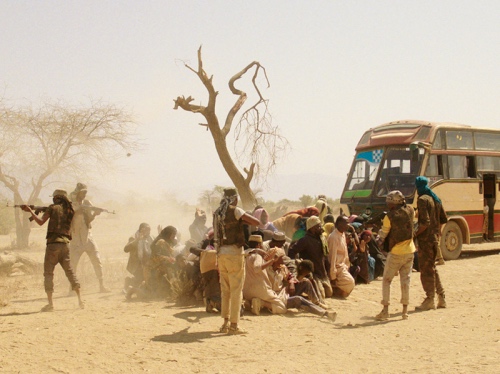
A scene from ‘Watu Wote’, based on the militant ambush of a Mandera, Kenya, bus in December, 2015. PICTURE: Courtesy of Hamberg Media School
It didn’t bring home an Oscar this week, but a film nominated for one is helping to spread a message that many Africans said is too rarely heard: that people from different religious groups on the continent can be each other’s heroes.
Watu Wote (“all of us” in Swahili), nominated for the best short film (live action), tells the true story of a 2015 attack on a bus in Mandera, in north-eastern Kenya, in which Muslim passengers saved Christian passengers from death.
Al-Shabaab gunmen had hijacked the bus and asked the Muslims to separate themselves from the Christians. But the Muslim riders refused and announced that if the extremists wanted to kill the Christians, the gunmen would have to kill everyone.
Though the 22-minute film was made by German graduate students, Watu Wote was filmed in Kenya with an all-Kenyan cast of both Muslims and Christians. And much pre- and post-production work occurred in Kenya.
The Academy Award nomination was a cause for celebration throughout the country. President Uhuru Kenyatta tweeted after the 90th Oscars ceremony in Los Angeles on Sunday: “You have won our hearts as a nation…Keep telling our stories through your camera and you will win next time.”
The award for best short film went to The Silent Child, which chronicles the life of a deaf four-year-old girl in rural England. But Watu Wote has won 40 awards across the world since its release, including its category at the Student Academy Awards.
Many in Kenya credit the the heroes of the bus incident – which came on the heels of a series of horrific al-Shabaab attacks on churches, shopping centres and other public places – with quelling Muslim-Christian animosity in Kenya, which is about 85 per cent Christian and 10 per cent Muslim.
“I think the film will have a lot of impact on the Christian-Muslim relations in Kenya and elsewhere,” said Julius Kalu, the retired Anglican bishop of Mombasa. “Those Muslims who attack Christians or vice versa do it from a point of ignorance, since there are many similarities among the two faiths.”
In the actual incident, the gunmen had sprayed the bus with bullets, killing two passengers. Salah Farah, a Muslim teacher who was shot as he shielded the Christians, died weeks later of the injuries. He was eulogised by both Christians and Muslims.
“Such good gestures exist among the faiths, but are never highlighted. It’s good a movie has explored these,” said Sheikh Abdullahi Salat, chairman of the Garissa Supreme Council of Kenya Muslims.






